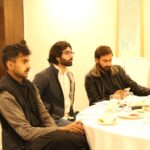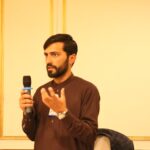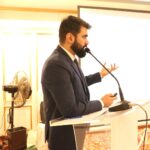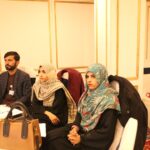Lack of ownership to ‘Paigham-i-Pakistan’ led to more unrest in society: CII chief
Training Workshop-3
Pak Institute of Peace Studies (PIPS) organized third two-day workshop titled, “Building Bridges: Fostering Tolerance and Inclusivity among Youth” on January 13-14, 2025, in Rawalpindi. The event brought together teachers and students from universities, colleges and seminaries from north Punjab, as well as human rights and civil society activists and practitioners. It engaged young minds in diverse discussions on topics such as tolerance, social harmony, citizenship rights, the constitution, cultural diversity, and the impact of media.
Team PIPS formally commenced the event with an introduction of the participants. Mr. Muhammad Murtaza, the Program Manager at PIPS, led the first session titled “Why This Workshop?”. He outlined the key objectives, aims, and purpose of the workshop, emphasizing its significance. To engage the participants, he facilitated an activity aimed at exploring their opinions and perspectives on tolerance and inclusivity in society. He stressed the importance of implementing diverse approaches and strategies to foster inclusivity, highlighting the need for open dialogue and communication to promote empathy within communities.
The next session, conducted by senior journalist Mr. Imran Mukhtar, focused on the topic “Constitution, Parliament, and Citizenship.” He elaborated on the relationship between these three entities and discussed significant amendments to Pakistan’s constitution. He particularly emphasized the importance of the Eighteenth Amendment. Additionally, he explained the trichotomy of power and the respective roles of the three branches of the state: the executive, the legislature, and the judiciary.
Mr. Dileep Doshi, a human rights activist and lawyer, conducted a session on the topic of “Cultural and Ethnic Diversity in Pakistan.” He remarked, “Pakistan is a land of diverse cultures and ethnicities. People express their cultural heritage through language, dress, food, and festivals.” He emphasized that diversity should be celebrated and individual identities respected. Mr. Doshi also addressed the distinction between the state and society, stating, “Society has greater potential than the state for preserving values. However, our society lacks direction. Social change is imperative; we must evolve.”
The subsequent session featured a panel discussion moderated by Mr. Amir Rana, President of PIPS, with distinguished panelists Maulana Ragheb Naeemi, Chairman of the Council of Islamic Ideology, and Mr. Khursheed Nadeem, Chairman of the National Rahmatul-lil-Aalameen Wa Khatanum Nabiyyin Authority.
The discussion centered on the Paigham-e-Pakistan initiative, which was developed as a counter-narrative to terrorism. Maulana Ragheb Naeemi remarked, “The situation in the Kurram region has demonstrated that Paigham-e-Pakistan is facing significant challenges and has yet to be implemented in its true essence.” He said that lack of ownership and non-compliance to the document has led to more unrest and tension in the society. “Had we adopted the Paigham-i-Pakistan wholeheartedly, there would have been a gradual decrease in the ongoing turbulence in the society,” Allama Naeemi noted.
Mr. Khursheed Nadeem provided an in-depth analysis of the evolution of Islamic societies and their varying levels of success in countries such as Indonesia, the UAE, Qatar, Kuwait, and, more recently, Saudi Arabia. He noted that Muslim societies in the Middle East were fast moving towards change by adapting to news trends, but Pakistani society looked stagnant. “Status quo forces are gaining strength in our country and a new turmoil is taking its roots in the name of change,” he said. Our youth is emotional and directionless, he also emphasized.
The day concluded with an interactive session led by Mr. Amir Rana. Engaging with the young audience, he explored the concept of realizing individual capacities. He stressed, “Dishonesty is the root cause of every social problem in our society.”
The second day began with a session by Ms. Hina Khaliq Taj, a Research Officer at PIPS, who delivered a presentation on “Gender Equality: Myths, Values, and Practices.” She highlighted the social challenges associated with gender inequality, presenting data to demonstrate how women face discrimination in societies like ours.
The next session was conducted by Mr. Asif Khursheed, a social media expert, who spoke on “Combating Fake News and Fostering Safe Spaces on Social Media.” He warned that fake and unauthentic information on social media had the potential to generate a conflict in society, advising the participants to avoid disseminating such information. He delved into how youth can reach out to authentic sources of information, emphasizing the importance of digital literacy in addressing the rising issues caused by misinformation spreading online.
The final session of the day featured an interactive activity led by Ms. Esham Farooq, also a Research Officer at PIPS. Participants were divided into groups and presented with various scenarios to test their conflict resolution skills. The activity was further analyzed by Mr. Amir Rana, who provided participants with insights into future planning.










